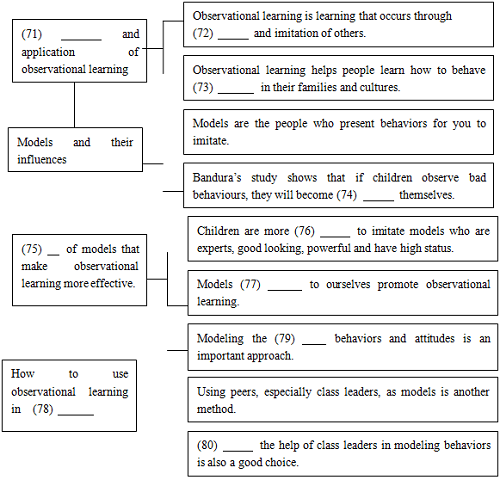题目内容
9._____difficult problems we may come across,we'll help one another to solve them.( )| A. | However | B. | Whenever | C. | Wherever | D. | Whatever |
分析 无论我们可能会遇到什么困难,我们会互相帮助克服这些困难.
解答 答案D.根据we'll help one another to solve them可知本句表示无论我们可能会遇到什么困难,我们会互相帮助克服这些困难,四个选项的含义分别是Wherever无论哪里;Whatever无论什么,后面接名词;However无论如何,然而,后面跟形容从或副词;Whenever无论何时.此句中difficult problems 的中心词是名词problems,所以答案是D.
点评 考查从属连词.Whatever有两个用法,一是引导名词性从句(如主语从句、宾语从句、表语从句),二是用于引导让步状语从句.
1.用于引导名词性从句
Whatever she did was right.她做的一切都是对的.
2.用于引导让步状语从句
Whatever we said,he'd disagree.无论我们说什么,他都不同意.

练习册系列答案
 天天向上一本好卷系列答案
天天向上一本好卷系列答案 小学生10分钟应用题系列答案
小学生10分钟应用题系列答案
相关题目
17.-Can you shoot that bird at the top of the tree?
-No.It's out of _______.( )
-No.It's out of _______.( )
| A. | range | B. | reach | C. | control | D. | distance |
18.---Do you have _____boy called He Liang in your class?
---No.Are you sure you got _____name right?( )
---No.Are you sure you got _____name right?( )
| A. | a; a | B. | the; a | C. | a; the | D. | the; the |
4.Please do not sign your name.Mark the responses that most nearly reflect your teaching practices.This is one way to reflect your practices and how much you got out of it.Keep one copy and give one to your tutor(s).
HOW OFTEN:
0=never 1=rarely 2=sometimes (1-2x/week)
3=moderately(3x/week) 4=often(4x/week) 5=daily
70.According to the passage,who most probably mark the responses in the form?B
A.Professional tutors.
B.Language teachers.
C.Personal physician.
D.Psychological therapist.
71.According to the passage,which frequency degree would you choose if you carry out the practice in the form not at all often?B
A.0
B.1
C.2
D.3
72.Mr.Kent bears EXTENTION OF LEARNING idea in mind,he quite often tends toD.
A.always set groups to encourage students to work out something by putting heads together
B.prepare grade-level materials for teaching
C.develop students reading skills during pre-while-and-post-reading stage
D.provide students with extra learning materials to further their study
73.Mrs.Grace likes to share her version of tasks outcome in class,which could be labeledC.
A.ASSESSMENT OF LEARNING
B.KNOWLEDGE CONSTRUCTION
C.DEMONSTRATION OF STRATEGIES
D.SELF-SELECTION.
HOW OFTEN:
0=never 1=rarely 2=sometimes (1-2x/week)
3=moderately(3x/week) 4=often(4x/week) 5=daily
| DEVELOPMENT APPROPRIATENESS:I provide opportunities for students to use literacy for their own purposes using previous knowledge,developmentally appropriate strategies and world experiences | 0 | 1 | 2 | 3 | 4 | 5 |
| EVIRONMENT:I use flexible grouping,e.g.pairs,small groups of different levels,small needs-based groups,and working alone. | 0 | 1 | 2 | 3 | 4 | 5 |
| KNOWLEDGE CONSTRUCTION:I provide opportunities for students to interpret literary and informational texts before,during and after reading or listening by talking,writing,enacting,drawing,etc. | 0 | 1 | 2 | 3 | 4 | 5 |
| ASSESSMENT OF LEARNING:I assess students'use of literacy strategies using this information to measure student progress and refocus my own teaching. | 0 | 1 | 2 | 3 | 4 | 5 |
| DEMONSTRATION OF STRATEGIES:I read aloud to students and write in front of them,using literary and informational texts. | 0 | 1 | 2 | 3 | 4 | 5 |
| READING STRATEGIES:I instruct students to read strategically,e.g.to reflect,predict,decode,question,connect,retell,summarize,map,etc. | 0 | 1 | 2 | 3 | 4 | 5 |
| WRITING STRATEGIES:I provide opportunities for students to work through the writing processes alone and with others,e.g.thinking about purposes and audiences,prewriting,drafting,revising,editing and publishing. | 0 | 1 | 2 | 3 | 4 | 5 |
| SELF-SELECTION:I provide time for the self-selection of books for independent reading in the classroom,and for book sharing. | 0 | 1 | 2 | 3 | 4 | 5 |
| DEVELOPING MEANING:I provide clear targets to students to develop higher levels of learning,e.g.What does it mean?Why do I need to know it?How will I use it? | 0 | 1 | 2 | 3 | 4 | 5 |
| EXTENTION OF LEARNING:I provide opportunities and activities for students to learn more about topics of their choice through problem-based learning assignments,etc. | 0 | 1 | 2 | 3 | 4 | 5 |
| BUILDING SUCCESS:I structure lessons/activities that provide opportunities for all students to experience success. | 0 | 1 | 2 | 3 | 4 | 5 |
A.Professional tutors.
B.Language teachers.
C.Personal physician.
D.Psychological therapist.
71.According to the passage,which frequency degree would you choose if you carry out the practice in the form not at all often?B
A.0
B.1
C.2
D.3
72.Mr.Kent bears EXTENTION OF LEARNING idea in mind,he quite often tends toD.
A.always set groups to encourage students to work out something by putting heads together
B.prepare grade-level materials for teaching
C.develop students reading skills during pre-while-and-post-reading stage
D.provide students with extra learning materials to further their study
73.Mrs.Grace likes to share her version of tasks outcome in class,which could be labeledC.
A.ASSESSMENT OF LEARNING
B.KNOWLEDGE CONSTRUCTION
C.DEMONSTRATION OF STRATEGIES
D.SELF-SELECTION.
14.I would love to talk to my grandparents _______ they're probably a book of knowledge waiting to be read.( )
| A. | though | B. | until | C. | because | D. | if |
1.-Mom,can I go to the zoo with Linda?-Sorry,you can't____ you haven't fully recovered from your flu.( )
| A. | until | B. | before | C. | as | D. | unless |
18.This ferryboat _____ to transport passengers between the harbor and the island for years.( )
| A. | is used | B. | was being used | C. | is being used | D. | has been used |
